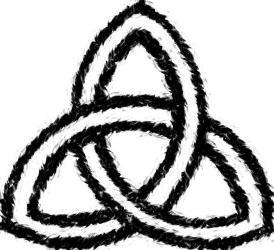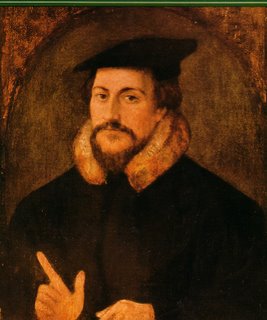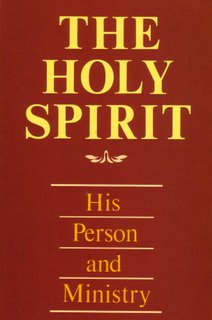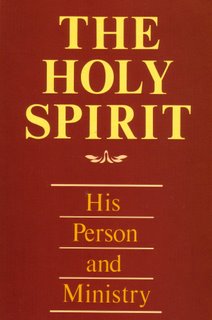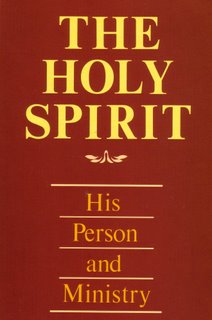Calvin’s Doctrine of the Church (V)
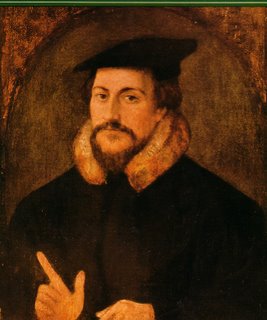 The Necessity of Reforming the Church (1543-1544)
The Necessity of Reforming the Church (1543-1544)There is a crying need for reforming the worship in modern churches. Much of what passes for “worship” today is little more than man-centered entertainment. It is called “seeker-sensitive” or “user friendly.” In essence, however, it does not qualify as worship but rather, what pleases man. Rarely—rarely—do modern churches ask the question: What is pleasing to God and in accordance with Scripture? regarding worship. As often as not, the modern Christian wants to know “What’s in it for me?” or “How does this make me feel?” rather than “Is this honoring to God and is it in accordance with Holy Scripture?”
In our past issues we have been examining what the Reformer, John Calvin, taught about the Church of Jesus Christ and today I want to focus our attention on his treatise, The Necessity of Reforming the Church, which was presented to the Imperial Diet at Spires in 1544.[1] The treatise itself was written at the end of 1543 so that it could be presented at the Diet.
Calvin’s desire was to present certain matters “as the common address of all who so earnestly deplore the present corruption of the Church, that they are unable to bear it any longer, and are determined not to rest till they see some amendment.”[2] In that sense, Calvin certainly reflects my sentiments with regard to our current situation. The “present corruption” of modern evangelicalism is widespread. It covers a wide gamut of modern churches ranging from those that embrace Open Theism, the “Willow Creek” experience, Bob Schuller, Joel Osteen, Rick Warren, New Age Mysticism, Christian Yoga and WWF, Emergent Church prayer labyrinths and votive candles, and pastors who are poorly trained—if trained at all—theologically. The word “evangelicalism” has become so amorphous that it could include anything or anyone—if fact, it has done precisely that.
I mention this because there were three keys points that Calvin raised in his treatise that are quite applicable today. What were those three specific areas?
First, there was Calvin’s concern for the pure and legitimate worship of God.
Second, he was equally concerned about the proper administration of the sacraments.
Finally, the question of true church government was an issue for him. [3]
I want to take a few moments and examine each category. I plan to devote more time to the first point for it is foundational—I just lost all the Emergent Church, postmodern crowd!—for the rest of what he says in the treatise.
The Pure and Legitimate Worship of God
One of Calvin’s concerns was with the proper worship of God. He was convinced that God, in his Word, had given us specific commands regarding true worship and that those commands were to be taken seriously. Typical of his concern is the following quotation from his treatise: “This much certainly must be clear alike to just and unjust, that the Reformers have done no small service to the Church in stirring up the world as from the deep darkness of ignorance to read the Scriptures, in laboring diligently to make them better understood, and in happily throwing light on certain points of doctrine of the highest practical importance. In sermons little else used to be heard than old wives’ fables and fictions equally frivolous.”[4]
According to Calvin, the Reformers had encouraged the reading of the scriptures as the path out of the abysmal darkness and ignorance caused by the Roman Catholic Church. In addition, the pastors labored to insure that God’s people were acquainted with the Bible and what God revealed in his Word. Moreover, Calvin also focuses on the important place of doctrine in the fulfilling of the pastoral office.
So let’s pause just for a moment and ask about the clear parallels between the modern Church and the Roman Catholic Church in 1544. What passes for preaching today in far too many churches is topical nonsense not based primarily on the Word of God but on the latest “fad” book to come down the pike. Again, as often as not, the congregants are given a dose of pop-psychology or position thinking claptrap. Pastors are less concerned with preaching the Word than they are in keeping the “troops” happy so they’ll return next week.
In both the mega-church and Emergent Church movements rarely—if ever—is a Reformer cited, but in the ECM especially appeals are constantly being made to the value of many aspects of the Roman Catholic Church. That ought to tell you a great deal. Let me ask this: when was the last time you heard a pastor in his teaching cite one of the Reformers positively? Any yet, these men are among the “giants” in Church History.
Calvin’s statement above places preaching of the Word at the center of worship. Once again, we can notice an interesting parallel with the modern Church. What is preached is of the essence. Sermons are not to be anecdotal, but expositions of the Bible, not skirting around matters that the pastor might not like or want to preach. He is to put himself aside and to preach the Word.
But why did he place such a premium on doctrine, especially in light of the fact that some today manifest a clear and obvious disdain for it? Out here in Southern California some pastors openly ridicule doctrine from the pulpit and discourage their congregational members from learning it. “Just give me Jesus” is the nonsensical mantra of a majority of evangelicalism today. The caveat, of course, is that no one can just give anyone Jesus, but apart from that once you begin talking about Jesus—two natures, one Person—you are up to your bicuspids in doctrine. Nevertheless, some still insist that doctrine is something to avoid. That partially explains why evangelicalism is virtually amorphous and bankrupt today.
As to the key place of doctrine in the pure worship of the Lord Calvin states emphatically, “All our controversies concerning doctrine relate either to the legitimate worship of God, or to the ground of salvation.”[5] He points out that worship should be neither frigid nor careless. In summary then, “as God requires us to worship him in a spiritual manner, so we with all zeal urge men to all the spiritual sacrifices which he commends.”[6]
Notice how tightly compacted Calvin’s words are. In our day and age we hear about being “practical,” “relevant,” and “culturally aware.” Our solution is to read the latest and greatest work on culture or the culture wars and then pass that along to God’s flock. Calvin, conversely, was convinced that doctrine must be kept central in the Christian’s walk of faith to insure legitimate (lawful) worship and the proper understanding of our salvation. A couple of examples will have to suffice here. In his debate with Cardinal Jacopo Sadoleto, Calvin made these following remarks regarding worship and justification by faith, respectively.
With a view to proper worship he said, “The primary rudiments by which we are wont to train to piety those whom we wish to gain as disciples to Christ are these; viz., not to frame any new worship of God for themselves at random, and after their own pleasure, but to know that the only legitimate worship is that which He himself approved from the beginning. For we maintain what the sacred oracle declared, that obedience is more excellent than any sacrifice (1 Sam. xv. 22). In short, we train them by every means to be contented with the one rule of worship which they received from His mouth, and bid adieu to all fictitious worship.”[7]
Regarding the centrality of the doctrine of justification by faith as the ground of man’s salvation, Calvin said this to Sadoleto: “Wherever the knowledge of it is taken away, the glory of Christ is extinguished, religion abolished, the Church destroyed, and the hope of salvation utterly overthrown…the gross ignorance of this doctrine which even still continues in all your churches, declares that our complaint is by no means ill-founded.”[8]
I ask you, where would you find an evangelical church today that could explain this central doctrine to its members or to an outsider? Luther went so far as to say that the doctrine of justification by faith alone is the doctrine upon which the Church stands or falls.[9] Which mega-church or Emergent congregation is dealing with the matter of justification by faith?
I’ll close this installment with Calvin’s sense of how lawful worship of the Lord not merely had to include the proclamation of biblical doctrine, but also how it must, by necessity, also be Christ-centered. Calvin puts it this way: “…we proclaim that a fountain of all blessings is offered us in Christ, from which we may draw everything needful. Our writings are witnesses, and our sermons also, how frequent and sedulous we are in recommending true repentance, urging men to renounce their reason, their carnal desires, and themselves entirely, that they may be brought into obedience to God alone, and live no longer to themselves but to him.”[10]
We could—and should—be having this debate today. Unfortunately, our contemporary debate would not only be with Roman Catholicism but also a large number who represent “mainstream evangelicalism.” The mega-church has long since abandoned the biblical heritage that the Lord has given us and the Emergent Church probably never really had it, so it is simply that much easier for the ECM to defect. The ravaging effects of postmodernism in the modern Christian Church was far too easy.The parents of the ECM crowd were, by and large, participants in the mega-church movement. They were given stones for bread, were not taught the importance and indispensable character of biblical teaching, family worship, and catechizing children, so they had no spiritual “legacy” to pass on to their children. Lack of solid biblical teaching for at least three decades has left us with an evangelicalism that is bereft of all but the most fundamental, rudimentary truths of the faith—if that. Every cry for revival is ill-placed. What is needed is not revival, but reformation; a reformation that listens attentively to the Word of God, preaches that Word, prays that Word, sings that Word, focuses on that Word in the administration of the sacraments of the New Testament Church, and fellowships around that Word.
[1] The exact title was The Necessity of Reforming the Church. To the most invincible Emperor Charles V., and the Most Illustrious Princes and Other Orders, Now Holding a Diet of the Empire at Spires, A Humble Exhortation Seriously to Undertake the Task of Restoring the Church. Presented in the Name of All Those Who Wish Christ to Reign.”
[2] J.K.S. Reid [ed.], Calvin: Theological Treatises, (Philadelphia: The Westminster Press, 1954), p. 185.
[3] Ibid., 186.
[4] Ibid., 186-187.
[5] Ibid., 187.
[6] Ibid.
[7] John C. Olin [ed.], John Calvin & Jacopo Sadoleto: A Reformation Debate, (Grand Rapids: Baker, 1966), p. 59.
[8] Ibid., 66.
[9] As a brief survey of the importance of justification by faith to Luther see the following works: Gerhard Ebeling, Lutherstudien, Band III (Tübingen: J.C.B. Mohr, 1985); Theodosius Harnack, Luthers Theologie, (München: Chr. Kaiser Verlag, 19272); Rudolf Hermann, Luthers These “Gerecht und Sünder Zugleich”, (Gütersloh: Bertelsmann, 1930); Gesammelte Studein zur Theologie Luthers und der Reformation, (Göttingen: Vandenhoeck & Ruprecht, 1960); Karl Holl, Gesammelte Aufsätze, Band 1, (Tübingen: J.C.B. Mohr, 19487); Kjell Ove Nilsson, Simul, (Göttingen: Vandenhoeck & Ruprecht, 1966); Otto Hermann Pesch, Theologie der Rechtfertigung bei Martin Luther und Thomas von Aquin, (Darmstadt; Wissenschaftliche Buchgesellschaft, 1985); Gordon Rupp, The Righteousness of God, (London: Hodder & Stoughton, Ltd., 19632).
[10] Reid, CTT, 188.

